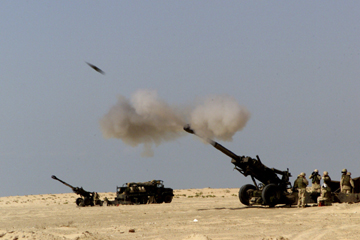
The first post-Desert Storm operation occurred in the Spring of 1991, when Baghdad began a campaign to suppress the dissident Kurdish minority in northern Iraq. More than 3/4 of a million displaced civilians were in dire need of food, water, shelter, and basic medical care as the prospect of thousands dying from starvation and deprivation loomed large. Marines of the 24th MEU (SOC), commanded by Colonel James L. Jones were some of the first U.S. forces deployed to the mountains of northern Iraq as part of Operation Provide Comfort. Operating some 500 miles form their supporting ships, over 3,600 Marines would take part in a three-month operation that successfully established a safe haven for the Kurds and staved off a humanitarian disaster.
Simultaneously, Marines the of the 5th MEB, returning through the Indian Ocean from Desert Storm, found themselves tasked to respond to another humanitarian crisis, in Bangladesh. A 140-mile-per-hour cyclone had ripped through the impoverished country killing an estimated 139,000 people. The Bangladeshi government requested assistance and President Bush ordered the deployment of a joint task force. On 16 May, Marines and sailors, augmented by a Japanese contingent, began the first full-scale relief operation. Marine helicopters were instrumental in delivering supplies to isolated pockets of people cut off by the flood waters. By 7 June the situation had stabilized as the country's infrastructure of roads and ferries were repaired. The efforts of the U.S. forces in Sea Angel saved countless thousands of lives.
One of the largest post-Cold War humanitarian operations began on 9 December 1992, when Marines of a Special MAGTF landed in Somalia, beginning Operation Restore Hope. Famine, caused by political chaos, threatened the lives of thousands of Somalis and the mission of Restore Hope was to secure major air and sea ports, key installations and food distribution points in order to facilitate the free passage of relief supplies threatened by a multitude of armed warlords. The combined Joint Task Force entitled UNITAF (United Task Force) commanded by Lt General Robert B. Johnston, Commanding General I MEF, included an additional 10,000 Marines from the 1st Division and 1st Marine Aircraft Wing. U.S. troops fanned out across the famine belt in and around the capitol of Mogadishu safeguarding the humanitarian relief operations. In addition to weapons sweeps, and convoy escorts, UNITAF forces pursued extensive civic action programs including repairing more than 1200 miles of roads, drilling wells, and rebuilding hospitals and schools. Coalition force medical personnel treated thousands of Somalis for everything from bullet wounds to typhoid. By the end of February 1993, the crisis had largely passed and U.S. forces, including Marines, were slowly withdrawn

Besides humanitarian operations, the most prevalent of Military Operation Other Than War operations is the non-combatant evacuation of civilians or NEO. Seven times since 1990 Marines have been called upon to evacuate civilians threatened by the anarchy and civil strife in their country. From Somalia (1990), Liberia (1990, 1996), Rwanda (1994), Sierra Lione (1997), and the Congo (1997), Marines have responded to the State Department's request to evacuate embassies and U.S. citizens. Even Europe, too, proved it was not immune from the strife when Marines of 26 MEU(SOC) executed Operation Silver Wake in Tirana, Albania, in March 1997. These operations displayed the versatility and rapid response ability of the MEU. The characteristics of a NEO operation area rapidly deteriorating political situation coupled with a collapsing economy where there is inadequate time to build up relief forces to perform an evacuation of U.S. citizens. Further, there is often not the luxury of land-based facilities from which to conduct such a large scale evacuation. Forward deployed and self-sustaining, the Marine Expeditionary Units' possess the capacity to insert forces by air into an embassy anywhere in the world, secure it, and then evacuate the U.S. citizens. In Operation Eastern Exit in 1990, Marine helicopters refueled twice in air to reach the embassy in Somalia; eventually, 281 citizens from over thirty nations were safely evacuated.
Not all of MOOTW occurred in foreign countries. In August 1992, Marines were called to provide assistance to Homestead, Florida following Hurricane Andrew. II MEF formed a Special MAGTF that included both active and reserve elements. The Marines maintained a temporary tent city for 2,500 displaced civilians. Additionally, Marines distributed needed supplies and helped restore power to Dade county. That same year, Marines from the 2d FSSG participated in Operation Guantanamo, which provided temporary humanitarian assistance to Haitians fleeing to the U.S. to escape political upheaval at home. At its height, the tent camps at Guantanamo Bay housed over 15,000 refuges. These camps were back in operation again in 1993 and 1994 as Marines helped safeguard Cuban refuges trying to flee economic hardship and repression. Along the Mexican border, Marines have actively engaged in providing assistance to the nation's counter-drug effort as part of Joint Task Force Six. Between October 1994 and September 1995, for example, Marines participated in 74 counter drug missions, performing supporting roles to U.S. law enforcement by providing observation, radar support and cargo inspection. Also Marines have been called upon to support civilian authority from combating forest fires in the western U.S. to restoring order in Los Angeles following the 1992 riots in Los Angeles.
The military operations other than war have increased in frequency and this high pace of operations has continued unabated as Marines are increasingly tasked to assist in these humanitarian and civic action missions. In 1992 alone, Marines executed nine non-combative operations. Marines have deployed to every ocean and covered such diverse operations as disaster relief in Guam to drug-interdiction along the U.S. border. Operations other than war have come to dominate Marine Corps operations that the Marine Corps has significantly expanded traditional training resulting in the employment of new non-lethal methodology.
| Sidebar Site Navigator | Full Screen | Home | Back |